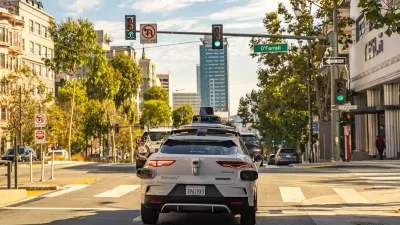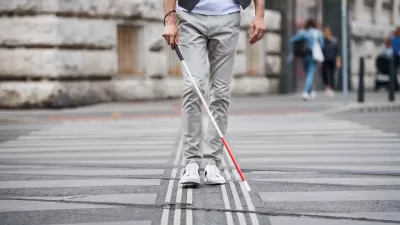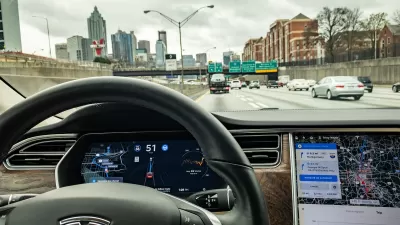The automated decision-making processes of self-driving cars are ill equipped to protect that safety of people of color in public.

"If you’re a person with dark skin, you may be more likely than your white friends to get hit by a self-driving car," reports Sigal Samuel.
That's the finding of a new study [pdf] by researchers at the Georgia Institute of Technology report that analyzed autonomous vehicles footage from New York City, San Francisco, Berkeley, and San Jose. Samuel explains the study in more detail:
The authors of the study started out with a simple question: How accurately do state-of-the-art object-detection models, like those used by self-driving cars, detect people from different demographic groups? To find out, they looked at a large dataset of images that contain pedestrians. They divided up the people using the Fitzpatrick scale, a system for classifying human skin tones from light to dark.
The researchers then analyzed how often the models correctly detected the presence of people in the light-skinned group versus how often they got it right with people in the dark-skinned group.
The results of the study are concerning, to say the least.
Detection was five percentage points less accurate, on average, for the dark-skinned group. That disparity persisted even when researchers controlled for variables like the time of day in images or the occasionally obstructed view of pedestrians.
Samuel ties the problem to the record of algorithmic bias—human bias influencing the results of automated decision-making systems. The human failure behind the machine's failure also implies potential solutions to the problem.
FULL STORY: A new study finds a potential risk with self-driving cars: failure to detect dark-skinned pedestrians

Alabama: Trump Terminates Settlements for Black Communities Harmed By Raw Sewage
Trump deemed the landmark civil rights agreement “illegal DEI and environmental justice policy.”

Study: Maui’s Plan to Convert Vacation Rentals to Long-Term Housing Could Cause Nearly $1 Billion Economic Loss
The plan would reduce visitor accommodation by 25% resulting in 1,900 jobs lost.

Planetizen Federal Action Tracker
A weekly monitor of how Trump’s orders and actions are impacting planners and planning in America.

Waymo Gets Permission to Map SF’s Market Street
If allowed to operate on the traffic-restricted street, Waymo’s autonomous taxis would have a leg up over ride-hailing competitors — and counter the city’s efforts to grow bike and pedestrian on the thoroughfare.

Parklet Symposium Highlights the Success of Shared Spaces
Parklets got a boost during the Covid-19 pandemic, when the concept was translated to outdoor dining programs that offered restaurants a lifeline during the shutdown.

Federal Homelessness Agency Places Entire Staff on Leave
The U.S. Interagency Council on Homelessness is the only federal agency dedicated to preventing and ending homelessness.
Urban Design for Planners 1: Software Tools
This six-course series explores essential urban design concepts using open source software and equips planners with the tools they need to participate fully in the urban design process.
Planning for Universal Design
Learn the tools for implementing Universal Design in planning regulations.
Caltrans
Smith Gee Studio
Institute for Housing and Urban Development Studies (IHS)
City of Grandview
Harvard GSD Executive Education
Toledo-Lucas County Plan Commissions
Salt Lake City
NYU Wagner Graduate School of Public Service





























